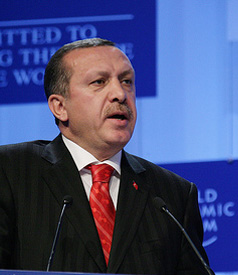Support justice-driven, accurate and transparent news — make a quick donation to Truthout today!
Once allies, relations after Israel’s raid on a Gaza-bound aid ship are at an all-time low.
Istanbul – After the Israeli attack on a Gaza-bound aid ship in May, the Turkish Prime Minister Recep Tayyip Erdogan said, “nothing would ever be the same again.”
Six weeks later, his ominous prediction appears to be coming true. The rift between the once close allies has never been wider.
The entire region, as well as the United States, is now anxious to see how Israel will respond to a statement by Turkey’s foreign minister that the country would sever ties unless Israel issues a formal apology, or at least accepts an international investigation.
With no response from Israel so far, rumors swirled Thursday on the streets of Istanbul and elsewhere that Turkey might soon make good on its ultimatum.
Turkey — irate over the deaths of eight Turks and one Turkish-American — has reacted strongly to the flotilla incident. Since recalling its ambassador from Jerusalem shortly after the attack, Ankara has banned Israeli military planes from its airspace, halted military exercises between the two countries and ended a 20-year agreement to supply Israel with water.
Erdogan, already infamous for his fiery rhetoric, has been true to form, calling Israel’s actions “pirate-like” and “barbarous.”
“I am sure that Israelis are disturbed by a perception equating the Star of Zion to the Nazi swastika,” he said in a speech in Konya the week following the attack, taking even those sympathetic to the Turkish position by surprise.
For its part, Israel hasn’t taken Turkey’s anger lightly. Israeli defense advisors were quickly withdrawn from Turkey following the incident and the government has warned Israelis against visiting Turkey.
Convinced that Turkey provoked the incident and wanting to avoid an international investigation, Israeli officials said, Israel has refused to apologize for the deaths.
An Israeli military investigation, in fact, found this week that while there were failures in its planning, intelligence and coordination, the killings onboard the Gaza-bound flotilla were justified. A further investigation, led by a retired Israeli Supreme Court justice, is in the works but it seems unlikely that Israel — still reeling from the U.N.-led Goldstone report into human rights abuses that took place during the 2009 Gaza invasion — will agree to the full international investigation called for by Turkey.
“At the moment it’s hard to imagine a way out of this situation,” Henri Barkey, a visiting scholar at the Carnegie Endowment for International Peace in Washington, said. “It could take years for things to be civil between the two countries again.”
The current state of Turkish-Israeli relations is now a far cry from the mid-1990s when Turkey’s military turned to Israel for help in improving its forces — leading to more than $1 billion in known deals.
But with the rise of a new middle class that is sensitive to issues affecting the Ummah, or the Muslim diaspora, the priorities of the governing Justice and Development Party — brought to power in 2002 in large part by this same constituency — are shifting gears, translating into a decreased role for the military and a larger one for the public, business and civil society.
“The government is no longer taking orders from the generals,” Lale Kemal, a journalist who writes a column on military affairs for the Turkish newspaper Zaman, said in an interview. “They are more assertive of their own power, rather than the military controlling politics.”
The administration of President Barack Obama, concerned about the thaw in relations between the two formerly strong allies, is now trying to mediate the conflict. Some analysts are hopeful that talks with the United States can bring an end to the standoff.
“The U.S.’s uneasiness with the strained ties will help push Turkey and Israel to reconcile,” Kemal said.
U.S. Secretary of State Hillary Clinton held a 45-minute discussion Monday with Turkey’s Foreign Minister Ahmet Davutoglu in which “the Secretary encouraged the foreign minister to continue important dialogue with Israel because that relationship remains a vitally important one to the future of the region,” P.J. Crowley, a State Department spokesman, said at a press briefing.
Both Turkey and Israel have something to lose if bilateral relations get any worse. Turkey is hoping for help from the United States in its ongoing conflict with the outlawed Kurdish Worker’s Party, which has tormented the country for decades and cost tens of thousands of lives, and Israel faces the potential loss of its first and only Muslim-majority ally in the region. There is also the more than $2.5 billion in trade the two countries have shared since 2009.
The president of neighboring Syria, Bashar al-Assad, is also concerned about what the dissolution of relations between Turkey and Israel would mean for the region. Assad warned last week that the crisis could affect stability around the entire Middle East and undermine Ankara’s role in the region’s ongoing peace negotiations.
“The chances of peace grow slim, and the prospect of war grows,” he told reporters.
Turkey Middle East Gaza aid flotilla Israel-Turkey relations Middle East peace negotiatons
Thank you for reading Truthout. Before you go…
…We ask that you take just a second to read this message.
We are up against a far-reaching, wide-scale attack on press freedom coming from the Trump administration. Since his inauguration last year, we’ve seen frightening censorship, a right-wing takeover of the news industry, and worsening financial conditions for progressive nonprofits across the board.
We can only resist Trump’s agenda by cultivating a strong base of support. The right-wing mediasphere is funded comfortably by billionaire owners and venture capitalist philanthropists. At Truthout, we have you.
We need your help to sustain the fight against authoritarianism in 2026. Please take a meaningful action in this fight: make a one-time or monthly donation to Truthout. If you have the means, please dig deep.
